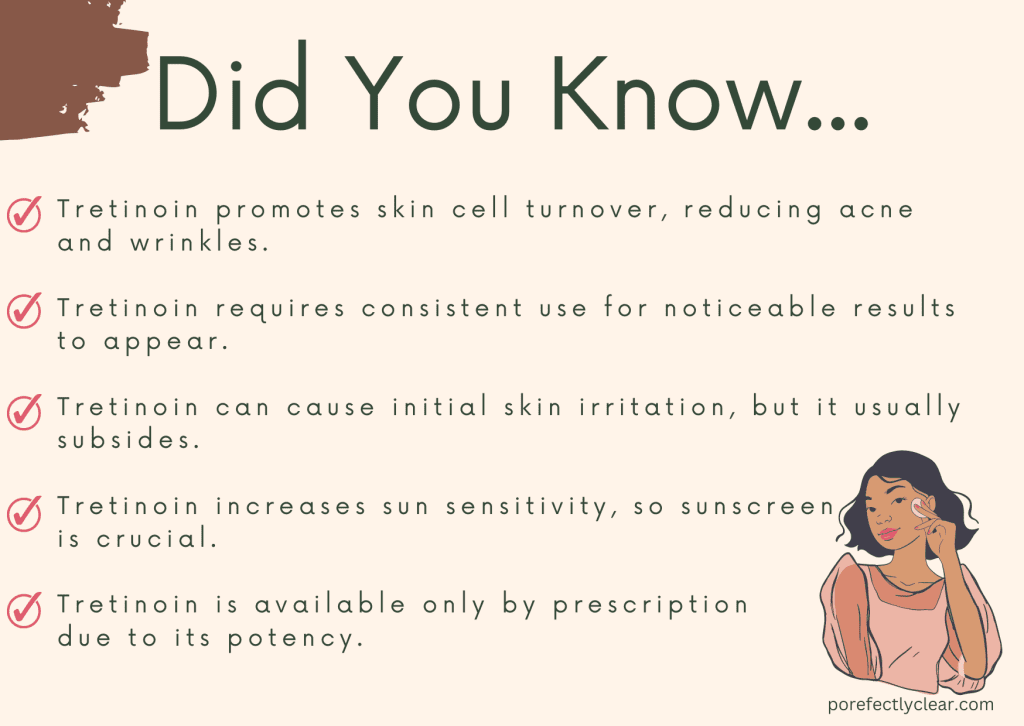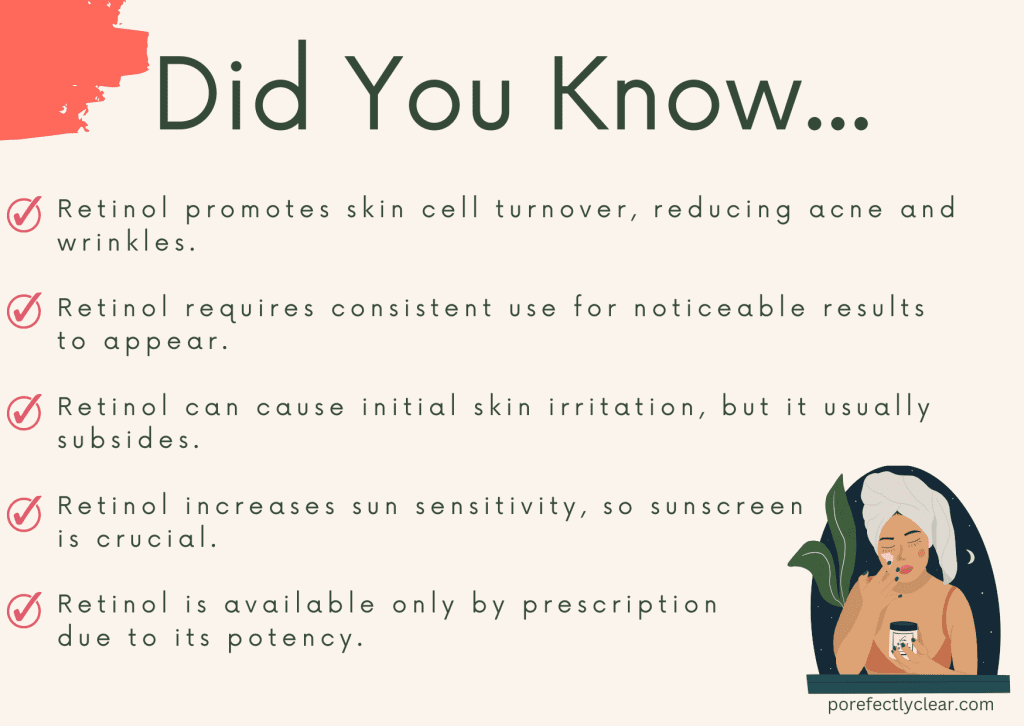Tretinoin, a powerful retinoid, has gained popularity in skincare routines for its remarkable benefits. However, for those following a vegan lifestyle, it’s important to understand whether tretinoin aligns with their values. In this blog, we will explore the vegan aspect of tretinoin, break down its ingredients, compare it with retinol, and explore vegan alternatives that can be incorporated into a skincare routine. So, if you’re wondering if tretinoin is vegan, keep reading to find out!
Understanding Tretinoin: A Brief Overview
Tretinoin, also known as all-trans retinoic acid, is a derivative of vitamin A. It is an active ingredient in many skincare products, known for its ability to promote skin cell turnover and reduce fine lines and hyperpigmentation. This powerful retinoid is commonly used in gel form for acne treatment, exfoliating the skin, and increasing skin renewal. Tretinoin can also be used to treat psoriasis by reducing inflammation in the skin. Despite its benefits, tretinoin can cause side effects such as redness and peeling, although these effects are often balanced by the improvements in skin texture. To minimize dryness, it is recommended to use tretinoin with a moisturizer.
What is Tretinoin?
Tretinoin, derived from vitamin A, is an active ingredient used in skincare products. This powerful retinoid promotes skin cell turnover, helping to reduce fine lines, hyperpigmentation, and acne. It also improves skin elasticity and resilience, making it a popular choice for skincare enthusiasts.
The Use of Tretinoin in Skincare
Tretinoin gel is commonly used for acne treatment, exfoliating the skin, and removing dead skin cells. By increasing skin renewal, tretinoin helps to maintain a youthful appearance. It is important to note that tretinoin may cause redness and peeling, but these effects are often outweighed by the benefits it brings to skin texture. To minimize dryness, it is recommended to use tretinoin with a moisturizer, ensuring your skin stays hydrated and healthy.

The Vegan Aspect: Breaking Down Ingredients
When it comes to vegan skincare, ingredient transparency is crucial. Let’s explore whether tretinoin, the active ingredient, is derived from animal sources, and the presence of common non-vegan ingredients in skincare products.
Is Tretinoin Derived From Animal Sources?
Unfortunately, tretinoin is not vegan, as it is derived from animal sources. This retinol serum, commonly used in skincare products, does not align with vegan principles. However, vegan retinol alternatives, such as bakuchiol, offer similar benefits without compromising your vegan skincare routine.
Common Non-Vegan Ingredients in Skincare Products
Non-vegan skincare products often contain collagen, squalane, and carotenoids, which are derived from animal sources. Many skincare products rely on these animal-derived ingredients for their skin benefits.
However, vegan skincare options provide alternative ingredients that are cruelty-free, ensuring you can care for your skin while staying true to your vegan lifestyle. Parabens, commonly used in skincare, may also pose vegan concerns, so opting for paraben-free vegan skincare is a great choice.
Natural vegan skincare focuses on botanical ingredients, providing nourishment and care without compromising vegan principles.
Comparing Tretinoin with Retinol: Similarities and Differences
To better understand tretinoin’s vegan alternatives, let’s compare tretinoin with retinol, another popular skincare ingredient.
How Does Tretinoin Differ from Retinol?
Tretinoin, stronger than retinol, requires a dermatologist’s prescription for effective skin care. It is synthetic, derived from vitamin A, and can have stronger effects on the skin, including side effects such as dryness and irritation.
On the other hand, retinol, milder than tretinoin, is available over the counter and can be vegan or synthetic. Both tretinoin and retinol are effective in treating hyperpigmentation and are commonly used in skincare. However, tretinoin may require a dermatologist’s guidance, especially for sensitive skin types.

Can Retinol Substitute for Tretinoin in a Vegan Skincare Regime?
Yes, retinol can substitute tretinoin in a vegan skincare regime. Vegan retinol serums, similar to tretinoin, provide benefits such as skin texture improvement, skin cell turnover, and fine line reduction. Retinol is milder, making it suitable for sensitive skin types, and can offer great results when incorporated into a vegan skincare routine.
However, it is always recommended to consult a dermatologist for personalized skincare advice. Youth To The People Retinal + Niacinamide Youth Serum is a PETA-approved vegan-friendly option that can be considered as an alternative to tretinoin in a vegan skincare regime.
Exploring Vegan Alternatives to Tretinoin
Now that we’ve established retinol as a vegan alternative, let’s explore other vegan options that can be incorporated into a skincare routine.
Bakuchiol: The Plant-Based Retinoid
Bakuchiol, a plant-based retinoid, has gained attention as an alternative to retinol. Derived from the seeds of the bakuchiol plant, this vegan ingredient provides skin benefits without side effects such as dryness and irritation. Bakuchiol stimulates collagen production, improving skin texture and elasticity. It also promotes skin renewal, reducing fine lines and wrinkles. Suitable for sensitive skin, bakuchiol offers great results while maintaining skin hydration and minimizing dryness.
Other Potential Vegan Alternatives
In addition to bakuchiol, other vegan alternatives to tretinoin include rosehip oil, which is rich in retinoic acid, and an active retinoid, derived from vegan sources, which exfoliates and improves skin texture.
Carotenoids, found in vegan skincare, help even skin tone and promote cell turnover, while enzymes such as papain and bromelain exfoliate the skin, revealing a healthy, glowing complexion. Squalane, a vegan moisturizer, hydrates the skin and helps maintain its barrier function, ensuring healthy skin renewal. Squalane’s richness also helps counteract the drying effects of retinol.
Choosing the Right Vegan Skincare Products
Now that we’ve explored vegan alternatives to tretinoin, let’s discuss factors to consider when choosing vegan skincare products.
Factors to Consider When Choosing Vegan Skincare
When choosing vegan skincare, prioritize synthetic retinol alternatives, ensuring they align with vegan principles. Consider skincare products suitable for your skin type, whether normal, dry, sensitive, or acne-prone. Look for vegan retinol serum that addresses your specific skin concerns, such as uneven skin tone or hyperpigmentation.
Opt for vegan skincare products that promote skin cell turnover, collagen production, skin barrier function, resilience, and healthy skin renewal. By considering these factors, you can build a vegan skincare routine tailored to your skin’s needs. Make sure to apply vegan moisturizer under your retinol, and consider applying it over top as well, if needed.
You’ll also need to dry your skin completely beforehand. And finally, avoid using physical or chemical exfoliants that same day, as the retinol may have a stronger effect on your skin after exfoliation.
Is There a Vegan Version of Every Skincare Product?
While vegan skincare offers a wide range of options, not every skincare product has a vegan alternative. Some skincare products, such as collagen creams, may rely on animal-derived ingredients, making vegan alternatives challenging.
However, vegan skincare brands are committed to providing vegan alternatives for popular skincare products, including cosmetics. It is important to read product labels, and ingredient lists, and consult vegan skincare resources for product transparency.
With cruelty-free, vegan retinol serum, moisturizer, and other essential vegan skincare products, you can create a vegan skincare routine that meets all your skincare needs.
Conclusion
In conclusion, it’s important to consider the impact of our skincare choices on animals and the environment. While tretinoin itself is not vegan-friendly as it is derived from animal sources, there are vegan alternatives available, such as bakuchiol.
When selecting skincare products, look for labels that clearly indicate they are vegan and free from animal-derived ingredients. Remember to also consider other factors, such as the product’s effectiveness and suitability for your skin type. Making conscious choices in your skincare routine can not only benefit your own well-being but also contribute to a more compassionate and sustainable world.





